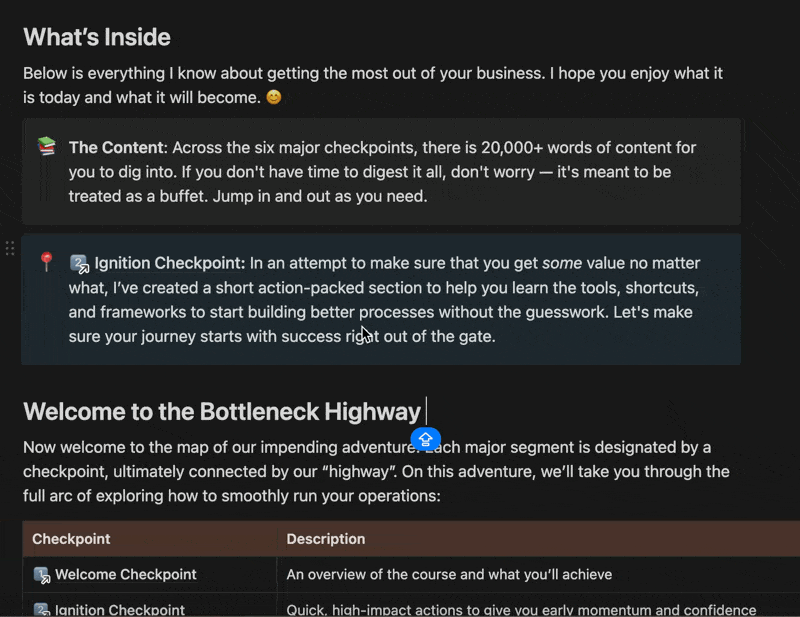Was this newsletter forwarded to you? Sign up to get it in your inbox every week.

⚙ Hi {{first_name_tally|Operator}},
Turns out Turkish business owners think our tariff panic is hilarious.
While you've been obsessing over where to move your factory, the smartest operators I know are creating borderless teams that make tariffs practically irrelevant.
Let me show you their playbook before my family confiscates my laptop for the rest of this vacation.
- Rameel

PRESENTED BY HUBSPOT
⚡ NEVER MISS A DEADLINE AGAIN
This toolkit contains the frameworks that have helped operational leaders:
Clarify who owns what (and prevent things from falling through cracks)
Create status updates people actually read and act on
Track progress without micromanaging your team
PRESENTED BY THE BOTTLENECK
What 140+ Elite Ops Leaders Use (While Everyone Else Drowns)
While your competitors manually track projects in spreadsheets, elite operators are crushing it with a completely different system.
This isn't theory. One ops leader at Brex implemented a single playbook from this system and saw their ticket backlog drop 78% in three weeks.
Inside: 40+ battle-tested playbooks and 12 templates I personally used to scale operations at my YC-backed startup.
Fix toxic teams in days, not months
Automate 20+ hours of manual work weekly
Prevent operational collapse during hypergrowth
P.S. We guarantee you'll save at least 15 hours weekly or get your money back
Thanks to our sponsors who keep this email free. Interested in sponsoring these emails? See our partnership options here

Jobs, jobs, and more jobs
Here are 3 jobs that might intrigue you:
This legaltech startup needs a Customer Success Manager in Dumbo, Brooklyn who can juggle 30+ tech company dissolution projects simultaneously. They're the specialists who save founders thousands of dollars and countless headaches when shutting down failed startups. $90-120K plus equity. (NYC, In-office)
This recruiting marketplace is absolutely crushing it - 8-figures in ARR since 2023, backed by founders of Canva, YouTube, and DoorDash. They need a Strategic Projects Lead in SF who can transform how companies hire. $90-150K + equity for someone who's been the main driver of success wherever they've worked. Prior early-stage startup experience required. Apply here. (San Francisco, In-office)
This team at one of Y Combinator's fastest-growing platforms is hiring a Director of Demand Generation who can be the keystone of their marketing operation. They've built the command center that revenue teams actually need - 150+ B2B customers already trust them to track channel performance and optimize customer journeys. $180-210K (top 10% comp for the role). You'll need previous Director-level experience in B2B SaaS and must work in their SF office.(San Francisco, In-office)
P.S. Open to new opportunities? Fill this out, and we’ll intro you to the best companies in the world

The Tariff Talent Arbitrage
Inspired by 20+ conversations with COO’s
Tariff panic blinds competitors to hidden talent pools.
Your CEO probably just dropped another CNBC article about Trump's latest tariffs into Slack. Your board is sending panicked texts about supply chain exposure.
And somewhere, a consultant is brewing up a very expensive deck about market diversification.
But after spending the past few weeks chatting with operations leaders who are navigating trade disruptions, I've noticed something fascinating: there’s a real opportunity for talent acquisition.
In Parts 1-3 of this series, I showed you how to identify tariff-advantaged markets and build compliance moats during trade disruption.
Now I'll reveal the final piece: how to build exceptional teams while your competitors are too busy relocating factories to notice the talent gold mine they're creating.
The Reverse Talent Flows Creating Hidden Opportunities
Most operators are focused exclusively on talent leaving high-tariff markets. But the truly transformative opportunities come from understanding the reverse talent flows happening simultaneously.
Here are three counterintuitive talent shifts creating arbitrage opportunities:
1. The Headquarter Repatriation
As companies hit by tariffs consolidate operations to headquarters locations, a unique talent pool emerges: internationally experienced executives suddenly available in major hubs like San Francisco, New York, and London.
These executives:
Have deep international experience
Understand multiple markets
Have operated through previous disruptions
Are available at discount rates as companies downsize
2. The Specialist Concentration
As operations consolidate in tariff-advantaged markets, specialists in those regions become overwhelmed with opportunity – creating bidding wars for their services.
Smart operators are looking one step beyond these obvious markets to find specialized talent:
Malaysia Example: While everyone races to Malaysia to escape Vietnamese tariffs, smart operators are targeting:
Malaysians working abroad who want to return home
Cross-border specialists in Singapore with Malaysian experience
Technical talent in secondary Malaysian cities overlooked by multinationals
3. The Compliance Expert Emergence
As we covered in Part 3, tariff shifts create massive compliance challenges. This has created unprecedented demand for a specific talent category: compliance experts with cross-border experience.
These specialists are now commanding premium salaries in obvious markets – but are available at reasonable rates if you know where to look:
Regulatory affairs professionals from adjacent industries
Trade compliance specialists in governmental organizations
Supply chain certification experts from consulting firms
The Ethical Dimension: Building Teams Without Being Predatory
Let's address the elephant in the room: there's a fine line between opportunistic talent acquisition and predatory behavior during market disruption.
Smart operators understand that building sustainable advantage requires an ethical approach that benefits both your organization and the talent you're acquiring. Here's the framework I give friends for ethical talent arbitrage:
Fair Compensation Despite Market Conditions
Offer rates that represent a fair discount to pre-disruption norms (20-35%)
Structure packages with long-term upside tied to new operation success
Avoid exploitative compensation that damages long-term relationships
Transparent Communication About Strategy
Be honest about your opportunistic approach with new team members
Create clear narratives about how you're building during disruption
Develop authentic relationships based on mutual benefit during turbulence
Strategic Support for Displaced Communities
Invest in training programs in disrupted markets where you're hiring
Support regional economic development beyond your immediate needs
Create goodwill that translates to talent access over the long term
Long-Term Commitment Signaling
Make visible investments that signal you're not just opportunistically hiring
Create career development paths for acquired talent
Build organizational structures that integrate new team members meaningfully
The Tariff-Resilient Team Structure
Beyond where and how to acquire talent, Trump's trade war requires fundamentally rethinking team structure to create tariff resilience. Here's the model that's working for operators building during disruption:
The Hub-and-Spoke Team Model
Rather than centralizing leadership or distributing it evenly, build a hub-and-spoke structure where:
Core Strategic Functions: Located in tariff-advantaged markets or headquarters
Specialized Technical Pods: Distributed across markets with talent arbitrage opportunities
Operational Redundancies: Strategically placed to mitigate future tariff shifts
Cross-Border Leadership: Deployed at connection points between operational nodes
This creates an organizational structure that can rapidly adapt to tariff changes by shifting workloads and responsibilities without relocating entire teams.
The Team Culture Bridge
Building cohesive culture across tariff-fragmented operations requires a deliberate approach:
Shared Purpose Beyond Markets
Create organizational mission that transcends geographical considerations
Develop narratives that connect team members across tariff boundaries
Build identity around adaptability and resilience during disruption
Ritualized Connection Points
Establish regular cross-border team interactions that build relationships
Create shared experiences that bridge cultural and tariff-created divides
Develop communication rituals that maintain cohesion despite distribution
Unified Success Metrics
Implement performance frameworks that align incentives across markets
Create shared goals that require cross-border collaboration
Develop recognition systems that celebrate achievements across the organization
The Glocalization Imperative: Building Local Relevance at Global Scale
As we wrap up this series, let's address the final challenge: how to build operations that are both globally integrated and locally relevant.
This challenge becomes particularly acute during trade wars, when market fragmentation creates pressure toward disconnected local operations.
The solution is a three-part glocalization framework:
1. Strategic Standardization vs. Tactical Localization
Instead of the conventional approach of broadly localizing operations, strategically determine:
Which operational elements must be standardized globally
Which elements create advantage through localization
How to build systems that allow both simultaneously
2. Cultural Translation vs. Cultural Transformation
Rather than attempting to export your domestic culture or completely adopt local approaches:
Identify core cultural elements that must translate across all operations
Determine cultural aspects that should adapt to local contexts
Create intentional "cultural translation" processes for key values and practices
3. Global Brand, Local Experience
Instead of choosing between global consistency and local relevance:
Build brand frameworks that maintain core identity elements across markets
Create market-specific expressions that resonate locally
Develop systems that ensure both consistency and relevance
The Final Word: Speed Beats Perfection
If there's one lesson that stands out from my work with folks navigating this trade disruption, it's this: in times of tariff-driven market turbulence, speed beats perfection every time.
The operators securing exceptional talent, entering advantaged markets, and building regulatory moats aren't waiting for perfect information or conditions – they're moving decisively while opportunity windows remain open.
As one buddy who just built a world-class team from tariff-displaced talent told me: "In six months, everyone will have figured this out. The advantage goes to those who move now."
So while your competitors are still analyzing tariff implications, what talent opportunity will you seize today?
P.S. Let me know what you thought of today’s piece! Reply to this email or tell me here!

Whenever you're ready, there are 2 ways we can help you:
Turn operational nightmares into high-performing machines with our comprehensive ops leadership system. These 40+ playbooks and 12 templates give you everything needed to fix toxic teams, automate manual work, and scale operations efficiently. Perfect for ambitious ops leaders ready to level up their impact and career.
We have a growing audience of 30,000+ operators from top companies like Apple, Meta, Stripe, Faire, and Google. Apply to feature your business in front of The Bottleneck readers.

Help me help you




